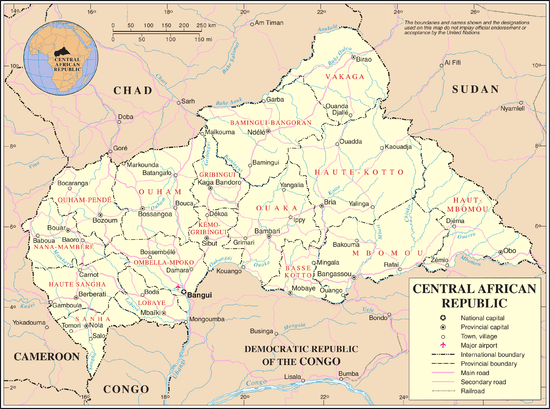United Nations Security Council Resolution 1125
United Nations Security Council resolution 1125, adopted unanimously on 6 August 1997, after expressing concern at the situation facing the Central African Republic, the Council authorised the continuation of the Inter-African Mission to Monitor the Implementation of the Bangui Agreements (MISAB) mission in the country for a further three months.[1]
| UN Security Council Resolution 1125 | |
|---|---|
 The Central African Republic | |
| Date | 6 August 1997 |
| Meeting no. | 3,808 |
| Code | S/RES/1125 (Document) |
| Subject | The situation in Central African Republic |
Voting summary |
|
| Result | Adopted |
| Security Council composition | |
Permanent members | |
Non-permanent members | |
Background
In 1996, there were three successive mutinies by elements of the armed forces in the Central African Republic which resulted in a political and military crisis. The Bangui Agreements were signed by the President of the Central African Republic Ange-Félix Patassé and rebel forces in the capital Bangui and an inter-African force (MISAB) was established to restore peace and security in the country and to monitor the implementation of the Bangui Agreements.[2]
Resolution
The Security Council determined that the situation in the Central African Republic constituted a threat to international peace and security and welcomed the efforts of states participating in MISAB.[3] It approved the efforts of the operation in securing a stable environment and supervising the surrendering of arms of former mutineers, militias and other persons.
Acting under Chapter VII of the United Nations Charter, countries participating in MISAB – Burkina Faso, Chad, Gabon, Mali, Senegal and Togo – to guarantee the safety and freedom of movement of their personnel for an initial period of three months.[2] The cost of the force would be borne on the participating states. Finally, the participating countries were required to submit reports every two weeks to the Secretary-General Kofi Annan.
See also
References
- "Acting under Chapter VII, Security Council authorises mission in Central African Republic to ensure its security, freedom of movement". United Nations. 6 August 1997.
- Sarooshi, Danesh (1999). The United Nations and the development of collective security: the delegation by the UN Security Council of its chapter VII powers. Oxford University Press. p. 244. ISBN 978-0-19-826863-5.
- Chesterman, Simón (2002). Just war or just peace?: humanitarian intervention and international law. Oxford University Press. p. 139. ISBN 978-0-19-925799-7.
External links

- Text of the Resolution at undocs.org